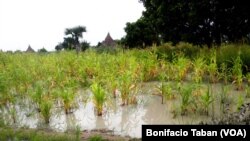BENTIU, SOUTH SUDAN —
A shortage of seed stock in Unity state in South Sudan is keeping residents from growing their own food, and they have turned to the government and local NGOs for help amid fears of widespread hunger if nothing is done to help them.
The plea for sorghum, maize, bean and vegetable seed stock comes after severe flooding last year wiped out the harvest in many communities, leaving food and seed supplies critically low and many residents hungry.
“If we are not provided with seeds the suffering will continue," said Michael Banak Dahnier, who lives in Payinjiar County, where flooding forced at least 40,000 residents to flee their homes last year.
"The only thing to stop what is happening is if the government and NGOs provide us with seeds in order to focus on agriculture to produce food for ourselves," he said.
Dahnier said 16 people in his area starved to death recently due to the poor harvest following the 2012 flooding.
Payinjiar was the food basket of the state until the heavy flooding last June washed away crops in the area before they could fully mature, resulting in poor harvests across the county.
Payinjiar County Commissioner Simon Chuol Biel said the authorities are working to provide seed to local farmers, and an NGO from Norway, Norwegian People's Aid (NPA) is funding the construction of dikes to try to prevent damage from flooding. The NPA has already released the first installation of 40,000 South Sudanese pounds for the project.
Biel urged other NGOs to also step up and aid what he said are more than 60,000 people in the area who are still feeling the impact of last year's floods, while residents have criticised the government for its inadequate response to food shortages that have hit the area.
The plea for sorghum, maize, bean and vegetable seed stock comes after severe flooding last year wiped out the harvest in many communities, leaving food and seed supplies critically low and many residents hungry.
“If we are not provided with seeds the suffering will continue," said Michael Banak Dahnier, who lives in Payinjiar County, where flooding forced at least 40,000 residents to flee their homes last year.
"The only thing to stop what is happening is if the government and NGOs provide us with seeds in order to focus on agriculture to produce food for ourselves," he said.
Dahnier said 16 people in his area starved to death recently due to the poor harvest following the 2012 flooding.
Payinjiar was the food basket of the state until the heavy flooding last June washed away crops in the area before they could fully mature, resulting in poor harvests across the county.
Payinjiar County Commissioner Simon Chuol Biel said the authorities are working to provide seed to local farmers, and an NGO from Norway, Norwegian People's Aid (NPA) is funding the construction of dikes to try to prevent damage from flooding. The NPA has already released the first installation of 40,000 South Sudanese pounds for the project.
Biel urged other NGOs to also step up and aid what he said are more than 60,000 people in the area who are still feeling the impact of last year's floods, while residents have criticised the government for its inadequate response to food shortages that have hit the area.




